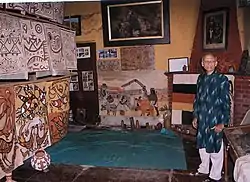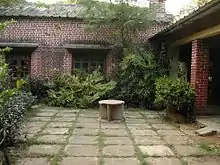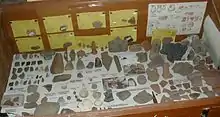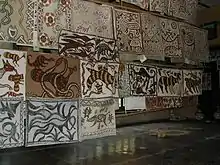Sanskriti Museum & Art Gallery
Sanskriti Museum & Art Gallery, Hazaribagh[1] was founded by Bulu Imam in 1991, after he discovered the first rockart of Hazaribagh district at Isco, subsequently bringing to light over dozen meso-chalcolithic rockarts, including the prehistoric archaeology of the North Karanpura Valley in Jharkhand.[2]
 | |
| Established | 1991 |
|---|---|
| Location | Sanskriti Centre, Hazaribagh |
| Coordinates | 24.009°N 85.378°E |
| Type | Archaeology, Anthropology, and Tribal Art |
| Director | Bulu Imam |
| Website | Official website |
The Sanskriti museum displays a comprehensive collection of Palaeolithic to neolithic stone tools, microliths, and bronze to Iron Age artifacts, including potteries and Buddhist antiquities from around the Hazaribagh region.[3] It also has an ethnological gallery dedicated to the Birhors, Santhals, and Oraons along with monographs complied on their Life, Folklore, Songs, Ethnobotany, available in the museum research archives, and library. It also has a gallery of local crafts and textile, and an art gallery over about 200 Khovar (marriage art) and Sohrai (harvest art) paintings of Hazaribagh exhibited and displayed.[4]
The museum is presently housed in his private[5] building which used to be the Tea Garden District labour Association building in the early 20th century (1919), in a 3 acres campus with a grove of trees.
The Sanskriti museum has a small library and a research archive, along with photographic and visual documentations to back up the exhibits in the museum. The library has several published papers, books, magazines and newsletters related to the Museum and Art Gallery in its Resource Archives and Library.[6]

Museum Collections
The museum has three major galleries- Archaeological Gallery, Ethnological Gallery, and Tribal Art & Crafts Gallery.


Archaeological Gallery
 Lower Palaeolithic stonetools
Lower Palaeolithic stonetools Middle Palaeolithic stonetools
Middle Palaeolithic stonetools Upper Palaeolithic stonetools
Upper Palaeolithic stonetools Mesolithic tools and Microliths
Mesolithic tools and Microliths Neolithic celts
Neolithic celts Mother Goddess Statue
Mother Goddess Statue Chalcolithic pottery from Hazaribagh
Chalcolithic pottery from Hazaribagh Iron-age furnace pipe & iron-slag castings from Isco
Iron-age furnace pipe & iron-slag castings from Isco Buddhist sculpture from Canary hill
Buddhist sculpture from Canary hill Chandi-Bonga deity on stone from Dipugarha
Chandi-Bonga deity on stone from Dipugarha Pala inscription from Dato, Hazaribagh
Pala inscription from Dato, Hazaribagh Terracotta Bird-woman Dipugarha
Terracotta Bird-woman Dipugarha
Ethnological Gallery
 Birhor Nets and traps from Hazaribagh
Birhor Nets and traps from Hazaribagh Malhar metal castings from Hazaribagh
Malhar metal castings from Hazaribagh
Tribal Art & Crafts Gallery
 Khovar and Sohrai Paintings
Khovar and Sohrai Paintings Embroidered Quilts or Ledras
Embroidered Quilts or Ledras
References
- "Sanskriti Museum And Art Gallery In Hazaribagh, India - Explore Location, History, Reviews, Photos And All About Sanskriti Museum And Art Gallery Hazaribagh". www.seejharkhand.com. Retrieved 2016-06-23.
- "About us- Sanskriti Centre". sinclairenvironmental.com. Retrieved 2016-06-23.
- "Sanskriti Museum & Art Gallery". sanskritimuseum.blogspot.co.uk. Retrieved 2016-06-23.
- "The Painted Forest Villages of Hazaribagh – Asian Art Newspaper". www.asianartnewspaper.com. 2016-05-18. Retrieved 2016-06-23.
- "Sanskriti Museum and Art Gallery, Hazaribagh, India | Museum/Art Gallery". 4mark.net. Retrieved 2016-06-23.
- "Sanskriti Museum & Art Gallery: Sanskriti Museum & Art Gallery". sanskritimuseum.blogspot.co.uk. Retrieved 2016-06-27.